
by Valeria Lembo | Oct 29, 2024 | CO-Roma Project, Event, News
So many people stopped by our stand to learn about our project on impact measurement at Maker Faire Rome- The European Edition 2024!
We’re proud to have participated as part of the CTE Roma – Casa delle Tecnologie Emergenti project and congratulations to all the Strong Innovators who won our Luiss Guido Carli University-branded gadgets!
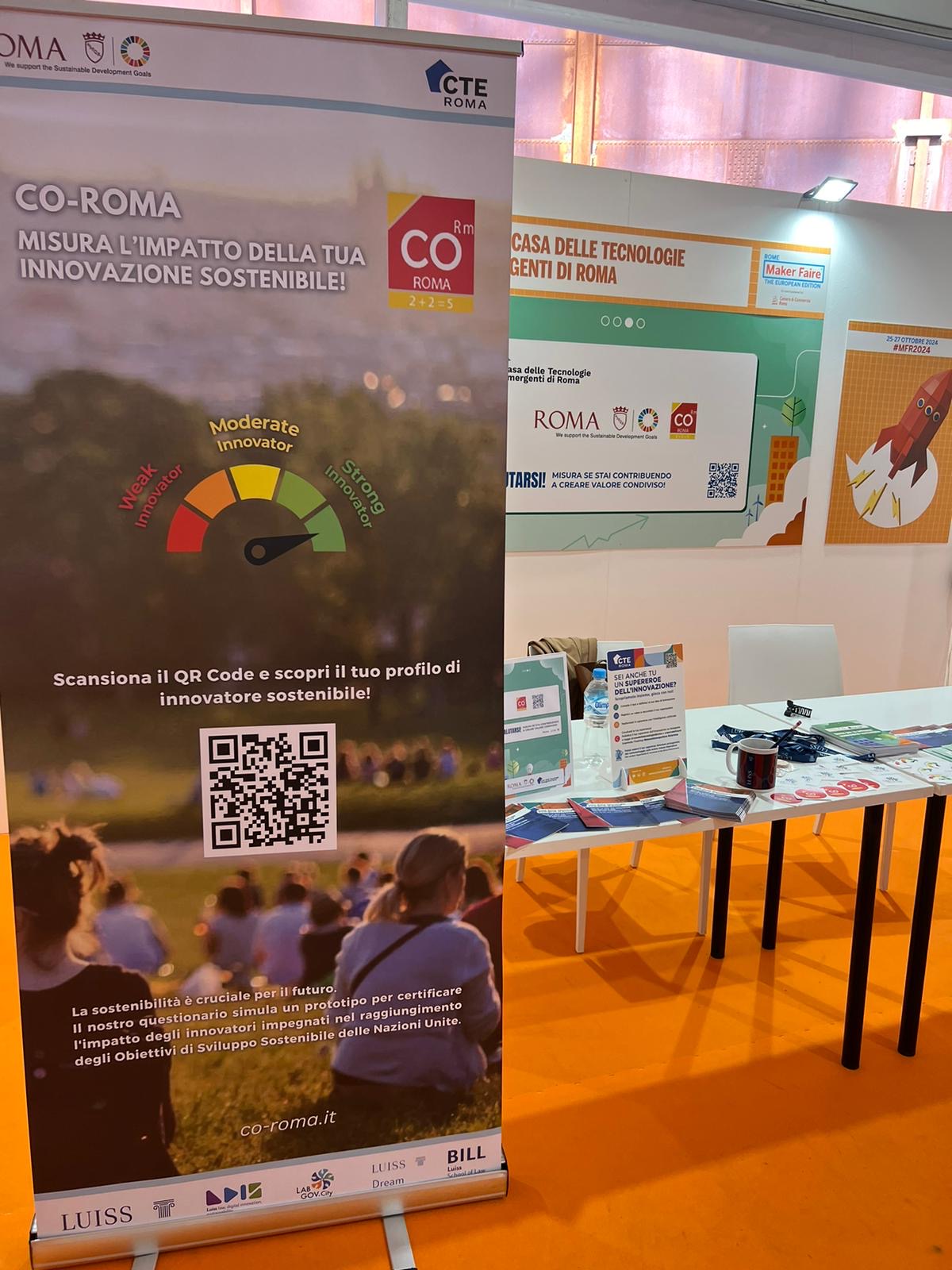
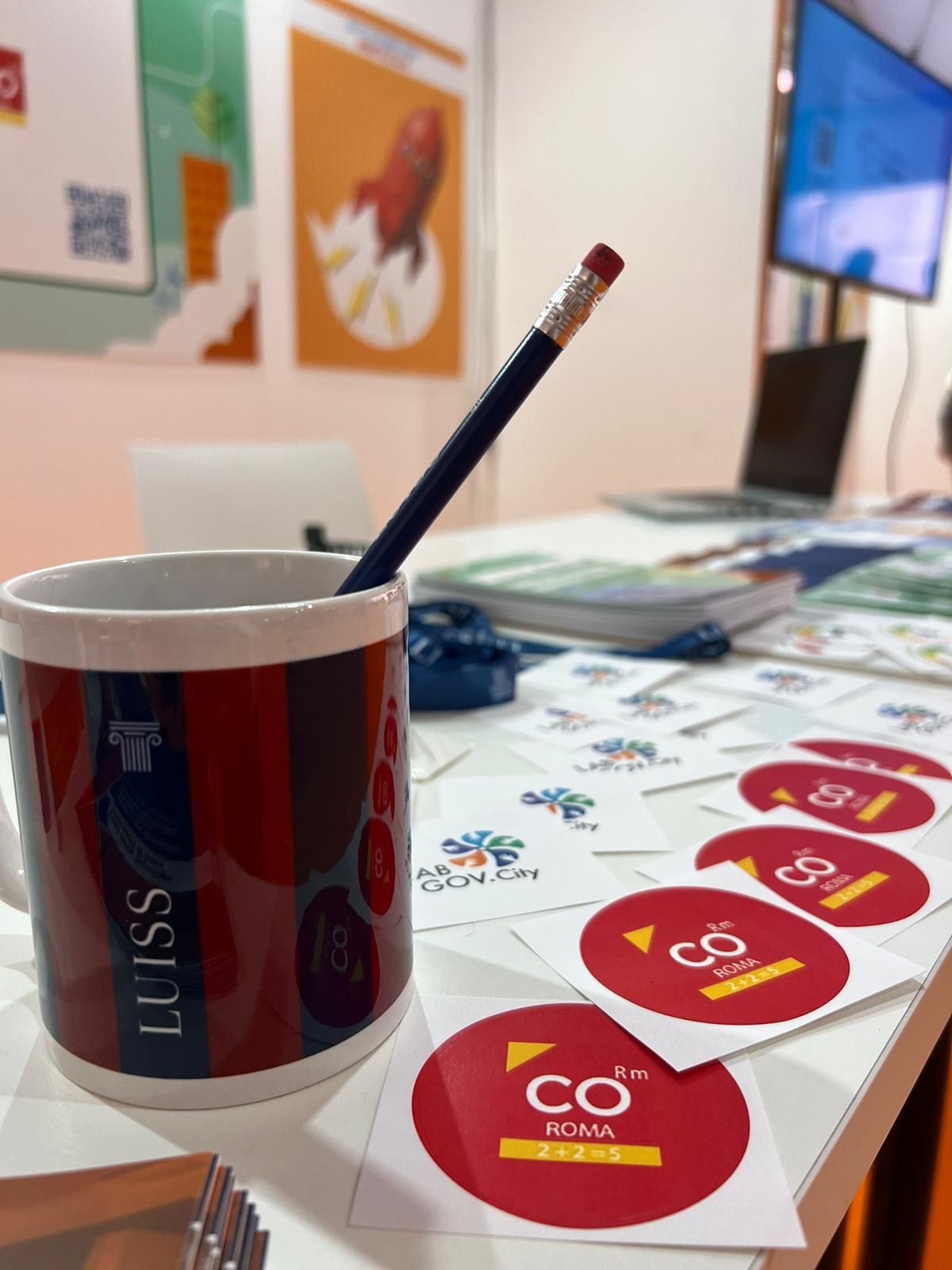

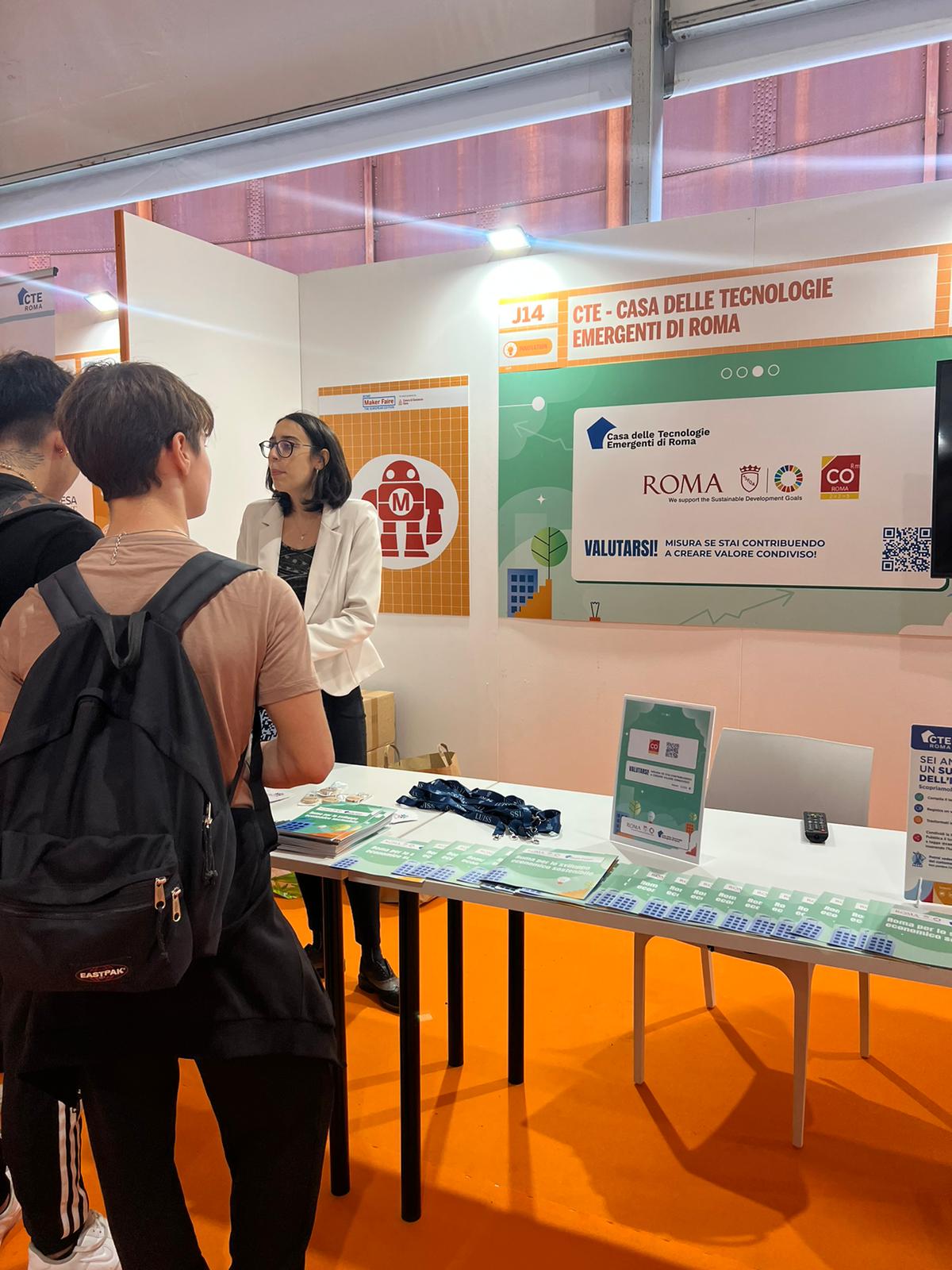
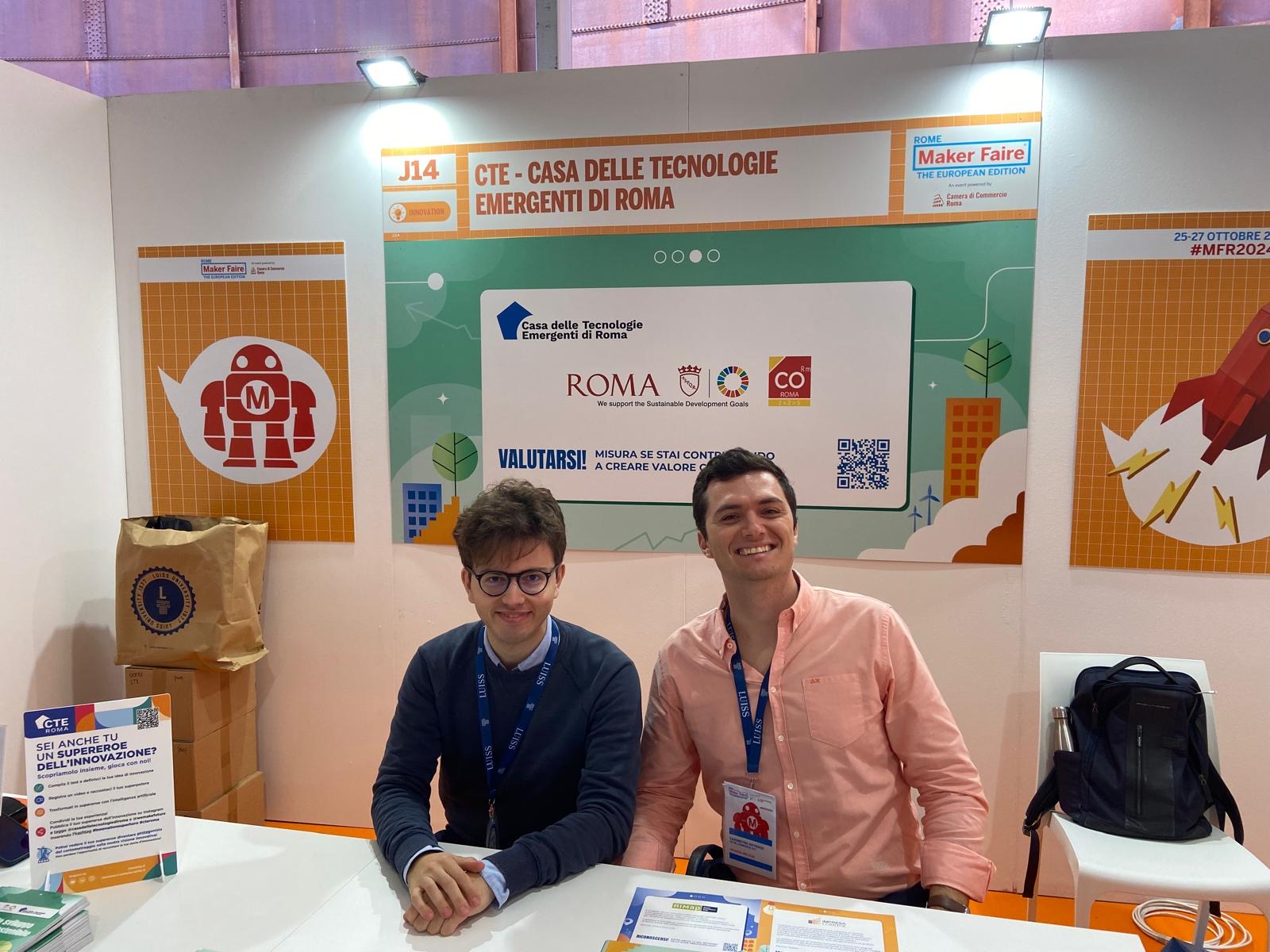
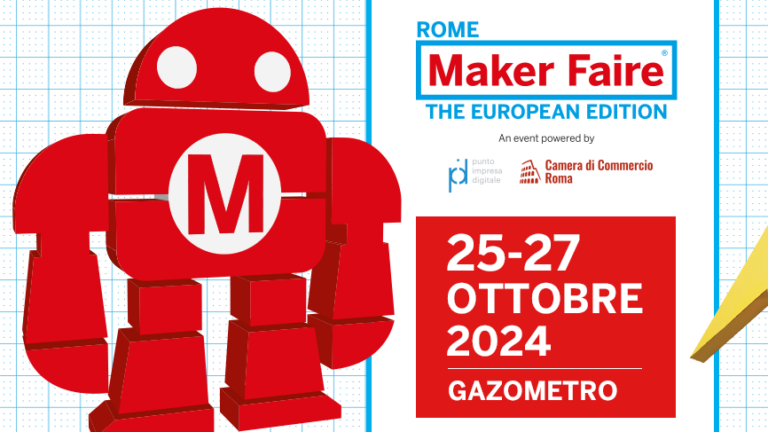
by Valeria Lembo | Oct 20, 2024 | CO-Roma Project, Event, News
We look forward to seeing you from tomorrow, October 25th, to Sunday, October 27th at the Maker Faire Rome- The European Edition at the Gazometro Ostiense!
We will attend to present our pilot project on impact measurement, developed by Luiss Guido Carli University and LabGov ETS as part of the CTE Roma – Casa delle Tecnologie Emergenti – Roma Open Lab project.
The project consists of a platform for measuring impacts across 9 key dimensions.
During the three days, we will present visitors with a questionnaire that represents a simplified version of our work, aimed at certifying the impact of innovators engaged in achieving the United Nations Sustainable Development Goals.
If you are a sustainable innovator, come and discover your impact level, which can be weak, moderate, or strong and measure the impact of your innovation!
We look forward to seeing you at the MakerFaire, from tomorrow to Sunday, at the Gazometro!
See you there!

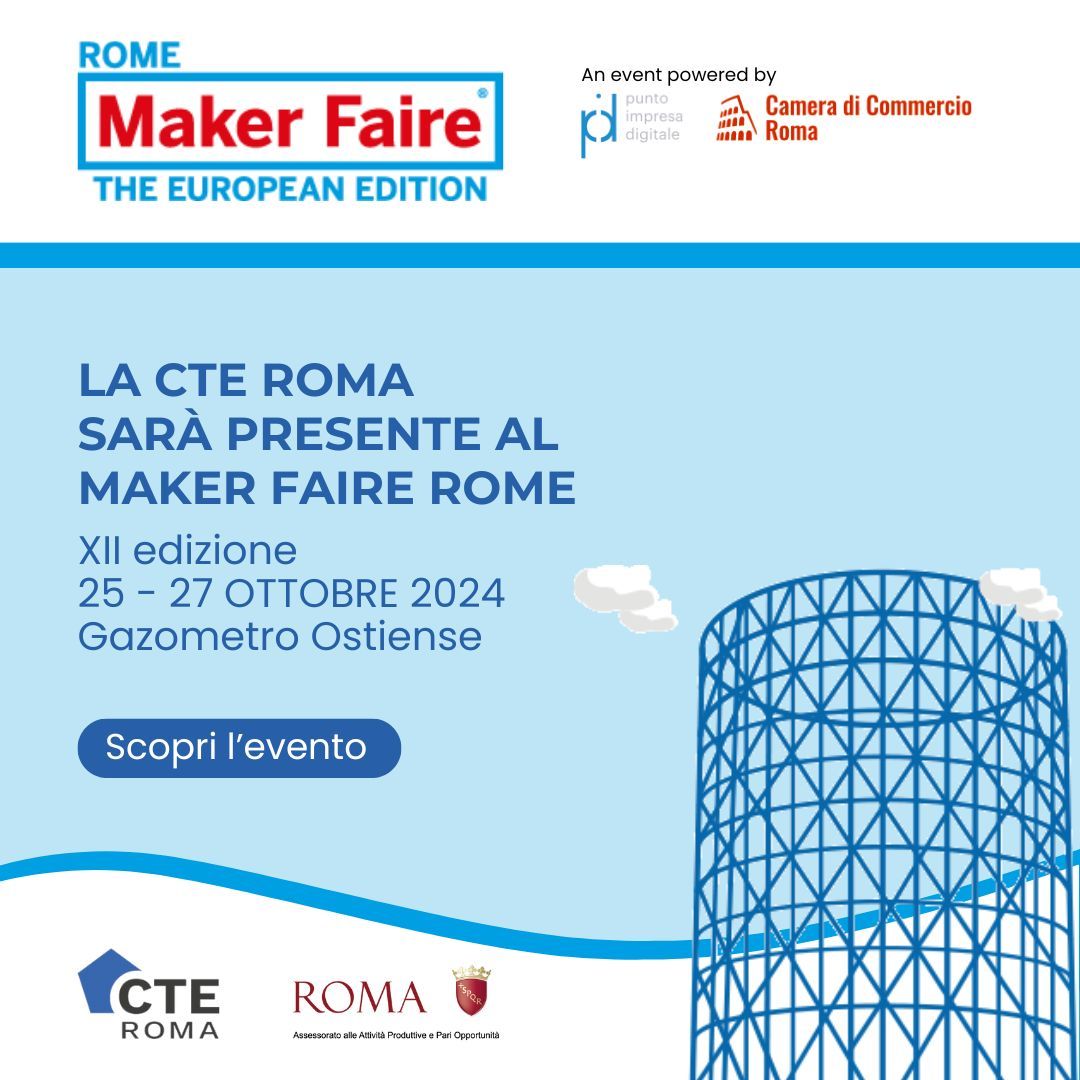

by Valeria Lembo | Oct 4, 2023 | CO-Roma Project
The purpose of the Santa Maria della Pietà Integrated Urban Plan is to create a Health and Wellness Hub, a hybrid infrastructure articulated in spaces and activities that aspire to promote people’s development through shared pathways that facilitate the improvement of their socio-occupational skills, the acquisition of new healthy lifestyles and prioritize psychophysical well-being, including through nutrition education, the promotion of new business ideas and innovation in agribusiness and health, legality, sports and exercise in an area also endowed with ecological and naturalistic value.
Therefore, the urban regeneration project on the Santa Maria della Pietà complex will have to contemplate actions to meet the growing need for new spaces for personal care and psycho-physical well-being, which find in the Santa Maria della Pietà facility a fertile environment where, while respecting the historical and cultural value of the complex, social welfare activities, job training, business development, workshops, and enjoyment and entertainment can be developed in its public spaces and particularly those endowed with ecological and naturalistic value – integrated activities that promote not only the well-being of people, but also a connection with neighboring neighborhoods and, ultimately, with the city.
In questo contesto, la Luiss Guido Carli in collaborazione con LabGov ETS (LABoratorio per la GOVernance dei beni comuni – LabGov ETS), entità non profit affiliata all’Università Luiss Guido Carli, intende avviare un laboratorio di co-progettazione per elaborare (i) una proposta di governance complessiva del complesso di Santa Maria della Pietà che dia vita ad un partenariato fra soggetti pubblici, della società civile organizzata e del Terzo settore, della scuola e delle università, di singoli o gruppi di cittadini, di privati sociali e/o responsabili (c.d. attori della quintuplica elica) e (ii) sviluppare un’ipotesi di programmazione funzionale per la rigenerazione di alcuni dei suoi padiglioni e in particolare dei padiglioni 24, 28, 41, ad oggi di proprietà della ASL e della Regione Lazio.

by Valeria Lembo | Oct 4, 2023 | CO-Roma Project
The House of Emerging Technologies in Rome represents a true living lab, the seat of innovation, experimentation and smart city-oriented design, inside the Tiburtina station.
This project was implemented by Roma Capitale with co-financing from MISE (Ministry of Economic Development) and other corporate partners, totaling about 6 million euros.
The idea behind this project is extremely dynamic and envisions an imminent future in which emerging technologies, such as blockchain, the Internet of Things (IoT), Artificial Intelligence (AI) and integration with 5G networks, will be the drivers of sustainable economic development in the city.
This multipurpose space aims to host a wide range of activities, including startup creation, technology transfer to small and medium-sized enterprises (SMEs), development of applied research projects and new experiments, as well as participation in educational events. Its more than 800 square meters include bright environments and offer a wide range of services and tools, including co-working spaces for individual work, meeting rooms for group work, brainstorming and co-design meetings.
In order to facilitate the participation of startups and SMEs, the House of Emerging Technologies in Rome will organize a series of workshops to facilitate the formation of entrepreneurial teams, the definition of ideas and the exchange of information between innovators and the business world.
This project has La Sapienza University, Tor Vergata University, Luiss Guido Carli University and Roma Tre University as university partners, while technical partners include LVenture Group, Innova and Peekaboo, and corporate partners include TIM, Acea and Wind-Tre.
Among the research, development and innovation activities supported by CTE is CO-Roma, the first active platform on the territory of Rome for sustainable and just urban innovation, also supporting co-design for the development of governance tools that facilitate technology transfer and integration among actors in the Roman innovation ecosystem.

by Valeria Lembo | Oct 4, 2023 | CO-Roma Project
Positive Energy Districts (PEDs or “PEDs”) are a key tool for achieving Europe’s Green Deal and climate goals by 2030. A PED is an energy self-sufficient, zero-carbon urban district. More precisely, the term “positive energy” refers to energy produced within districts through the use of renewable energy sources and fed back into the grid.
However, PEDs often constitute isolated realities within cities, and the challenge is to integrate them harmoniously into pre-existing urban contexts, creating climate-neutral, resilient and livable neighborhoods.
There are visions, plans, designs and solutions for PEDs, but the real issue is the definition of concrete, innovative, inclusive and shared co-design strategies for existing PEDs.
The goal of PED4ALL is to develop feasible, operational, implementable, and inclusive strategies that can be adopted by DPEs and neighborhood stakeholders in order to promote a profound energy transition in cities. This three-year project will involve an action-oriented network of DPE and neighborhood stakeholders in Belgium, Italy, and Turkey, who will apply a shared co-design methodology to define a set of energy, policy, regulatory, governance, social, spatial, and design strategies for urban transition and innovation. These strategies will be tested and may become replicable.
Project partners will engage in a series of online and in-person activities to co-produce a set of practical tools aimed at creating a community of practice and positioning Europe as a global model for urban energy transformation.

by Valeria Lembo | Oct 4, 2023 | CO-Roma Project
For several years now, LabGov -LABoratory for the GOVernance of the city as a common good has been devoting great attention to the issue of urban agriculture.
The experiences of urban agriculture, and in particular urban gardens and shared gardens, are central in the management of the city as a common good and in the engaged research activity carried out by LabGov, consisting in the study and development of methods, policies and projects aimed at the shared and collaborative management of urban spaces and resources. Urban gardens, in fact, especially in the Roman reality, were born and are born in the vast majority of cases in abandoned or inadequately cared for green spaces. They are born thanks to the initiative of individual citizens or groups of citizens, who gather around the aforementioned green spaces, as a hobby, for ecological reasons, with the intention of making a place come back to life (and live) and/or simply to be in community. Spaces of this kind then contribute to making the ‘surrounding area more pleasant and livable, thus increasing the quality of life and social harmony in the neighborhood, they are for this reason fundamental in the urban planning phase.
LabGov, since its founding, has paid special attention to this issue. In 2014, students of the EDU@LabGov urban clinic (the LabGovers), held by LabGov at LUISS Guido Carli University, made a decisive contribution to the creation of Italy’s first university community garden, the #ortoLUISS. Since then, the LabGovers have been co-managing this innovative university space and making it a training ground for collaboration and experimentation. Many are in fact the projects that have been born in the garden and that more than once have been spread and replicated in the neighborhoods of the city of Rome. To date, in fact, there are four urban satellite gardens of the #ortoLUISS scattered throughout the city and its suburbs. The 2015/16 A.A. LabGovers helped to create, in collaboration with two associations of the V Municipio, 100 and a capo APS and Comunità per il Parco Pubblico di Centocelle ODV, with the association Zappata Romana and with ENEA – Agenzia Nazionale per le nuove tecnologie, l’energia e lo sviluppo economico sostenibile, three urban vegetable gardens in vascone, installed at a garden adopted by the first of the two associations and open to the attendance and participation of the city’s inhabitants. The 2016/17 A.A. LabGovers created in collaboration with the Community for Centocelle Public Park ODV and ENEA a series of urban box gardens, donated on a day of celebration and retake two ROM families in the area and installed in a private part of Centocelle Park. The A.A. 2017/18 LabGovers helped create, together with students from the Master of Landscape Architecture degree program, chaired by Professor Alessandra Battisti, and agronomist and botanist, Professor Barbara Invernizzi, the Community for Centocelle Public Park ODV and ENEA, a series of vertical and in-box urban gardens, which were installed in the garden of the Rugantino Public Library, in Torre Spaccata, and in the garden adjacent to it, taken over and cared for by the Community. During this last year of work, LabGovers helped create, in collaboration with other LUISS students, an urban garden at the Boccioni Elementary School, Parioli.
These four urban gardens, like all gardens in the city, have multiple functions. To date, in fact, these realities, in addition to having a recreational function for the community gardeners who tend them and contribute to the regeneration of urban greenery, constitute an important point of social aggregation thus facilitating the establishment and/or strengthening in terms of cohesion of local communities, which find themselves collaborating in the governance of real urban commons. In addition, urban gardens increasingly represent a place of integration and learning for all those who frequent them. In fact, to date, there are many examples of social inclusion that gravitate around the reality of urban gardens, to name a few, in the university garden of the Luiss is involved for years now an association, of autistic children (Giardinieri Ribelli), who have the opportunity to learn the rudiments of agriculture thus being included in this environment. Another example of integration fostered by urban gardens is that of foreigners, demonstrated by the project “Intergenerational and solidarity urban gardens,” which allows young immigrants to be able to come into contact with the local urban reality and learn the knowledge necessary for the practice of agriculture.
In addition, since May this year LabGov has become an integral part of RU:RBAN, a European network funded by the EU project URBACT III, as a facilitator among the various stakeholders involved in the project. The network envisages the creation of a Local Action Plan, with the participation of Roma Capitale and local stakeholders, aimed at the implementation of a public policy directed at social inclusion and urban regeneration activities with a focus on what concerns agriculture in the city.













